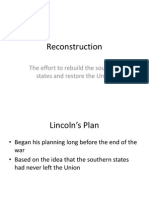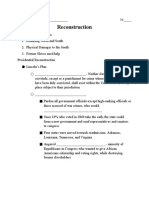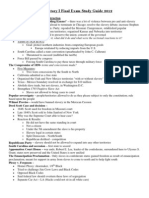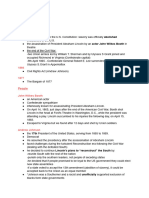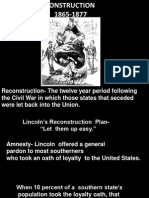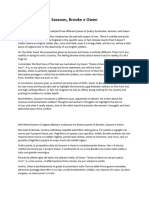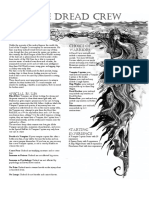100% found this document useful (1 vote)
592 views4 pagesChapter 23: The Reconstruction Era
The Reconstruction Era followed the Civil War and aimed to rebuild the South and bring the former Confederate states back into the Union. This involved establishing new loyal state governments that respected federal authority and abolishing slavery. President Andrew Johnson's lenient Reconstruction plan allowed Southern states to rejoin if they ratified the 13th Amendment abolishing slavery. However, Radical Republicans passed new laws over Johnson's vetoes to better protect the rights of freedmen, such as the Civil Rights Act of 1866 and the 14th Amendment granting citizenship and equal protection under the law. The South enacted Black Codes limiting the rights of freedmen, leading Congress to impose harsher military Reconstruction under the Military Reconstruction Acts.
Uploaded by
Hannah BCopyright
© © All Rights Reserved
We take content rights seriously. If you suspect this is your content, claim it here.
Available Formats
Download as PDF, TXT or read online on Scribd
100% found this document useful (1 vote)
592 views4 pagesChapter 23: The Reconstruction Era
The Reconstruction Era followed the Civil War and aimed to rebuild the South and bring the former Confederate states back into the Union. This involved establishing new loyal state governments that respected federal authority and abolishing slavery. President Andrew Johnson's lenient Reconstruction plan allowed Southern states to rejoin if they ratified the 13th Amendment abolishing slavery. However, Radical Republicans passed new laws over Johnson's vetoes to better protect the rights of freedmen, such as the Civil Rights Act of 1866 and the 14th Amendment granting citizenship and equal protection under the law. The South enacted Black Codes limiting the rights of freedmen, leading Congress to impose harsher military Reconstruction under the Military Reconstruction Acts.
Uploaded by
Hannah BCopyright
© © All Rights Reserved
We take content rights seriously. If you suspect this is your content, claim it here.
Available Formats
Download as PDF, TXT or read online on Scribd
/ 4

